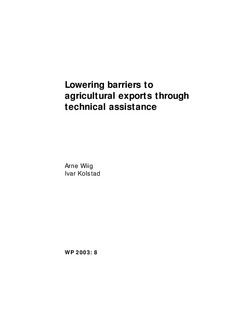Lowering barriers to agricultural exports through technical assistance
| dc.contributor.author | Wiig, Arne | |
| dc.contributor.author | Kolstad, Ivar | |
| dc.date.accessioned | 2008-02-22T12:14:06Z | |
| dc.date.accessioned | 2017-03-29T09:12:02Z | |
| dc.date.available | 2008-02-22T12:14:06Z | |
| dc.date.available | 2017-03-29T09:12:02Z | |
| dc.date.issued | 2003 | |
| dc.identifier.isbn | 82-8062-054-0 | |
| dc.identifier.issn | 0804-3639 | |
| dc.identifier.uri | http://hdl.handle.net/11250/2435733 | |
| dc.description.abstract | Sanitary and Phytosanitary (SPS) regulations imposed by the developed world, significantly reduse the export opportunities of developing countries. Under the SPS Agreement, developed countries are obliged to provide technical assistance to developing countries, to help them meet SPS requirements. A survey of providers of technical assistance reveals, however, that assistance is allocated in an ad hoc manner. This article argues for a more systematic allocation of technical assistance to developing countries, based on relevant data and comparisons of benefits and costs of different kinds of capacity building. Data is presented which highlights the major problems of developing countries in exporting to the European Union, complementing earlier studies of exports to the United States. | |
| dc.language.iso | eng | |
| dc.publisher | Chr. Michelsen Institute | |
| dc.relation.ispartofseries | CMI Working paper | |
| dc.relation.ispartofseries | WP 2003:8 | |
| dc.subject | Food policy | |
| dc.subject | Agriculture | |
| dc.subject | Exports | |
| dc.subject | Technical assistance | |
| dc.title | Lowering barriers to agricultural exports through technical assistance | |
| dc.type | Working paper |
Tilhørende fil(er)
Denne innførselen finnes i følgende samling(er)
-
Bora-import [434]
